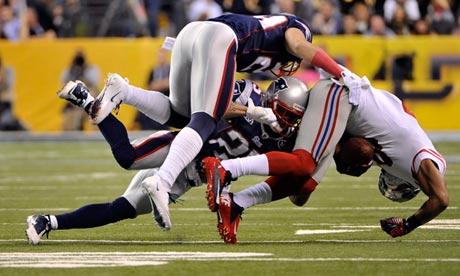
With their helmets and padding, American footballers always look like they are ready for anything that can be thrown at them. And they certainly have better armour than their rugby-playing counterparts in the UK. But despite their impressively warrior-like appearances, Barack Obama is worried about them.
So worried, in fact, that he said if he'd had sons he would have thought "long and hard" before allowing them to take up the national sport, insisting the game should become less violent, and adding that he was particularly anxious about college players.
His comments came ahead of the Super Bowl next month, but also after an increasing amount of research into the effects of injuries, especially concussion, on players. At Boston University, researchers have been studying the brains of sportsmen and women and soldiers who have had head injuries. Such damage, they have shown, can cause disastrous long-term problems including a degenerative brain injury, called chronic traumatic encephalopathy. One study of 35 former professional American football players found that 34 showed signs of brain injuries.
Players and their families have complained that the National Football League (NFL) has turned a blind eye to the dangers involved in the sport, especially those that come from repeated concussions and head injuries. More than 4,000 players have brought cases against the NFL. Relatives of Junior Seau, a former San Diego Chargers player, and the Chicago Bears star Dave Duerson have even filed wrongful death lawsuits against the league.
While American football may be a niche interest in the UK, rugby is often seen as similarly dangerous – so should David Cameron be as worried as President Obama? Not according to Jim McKenna, a professor of physical activity and health at Leeds Metropolitan University (and a rugby coach). He points out that American footballers tackle with their heads, butting each other in a way seldom seen in rugby. "They butt the opposition and their head is the tip of the missile, with an enormous body of weight behind them," says McKenna. Meanwhile, the helmets and padding the US sportsmen wear can actually make the situation worse, he thinks, encouraging them to use more force.
In rugby it is spinal injuries from scrums that are the most dangerous (110 rugby players in Britain have been paralysed by playing the game). Allyson Pollock, a professor of public health, says that she is very worried about amateur rugby players, and especially children. Coaches, she says, are not properly trained to look out for the signs of concussion or taught how to deal with it – although it can have serious problems for children's learning and cognitive functions. She would like to see large-scale studies of the effects of such injuries, and says the sport establishment needs to think carefully about tackles. In 2010, she called for scrums to be banned after a study found that 190 rugby matches at Scottish schools resulted in 37 injuries. "Most children are not going to go professional, so why are their bodies being mauled and mashed and battered?"

